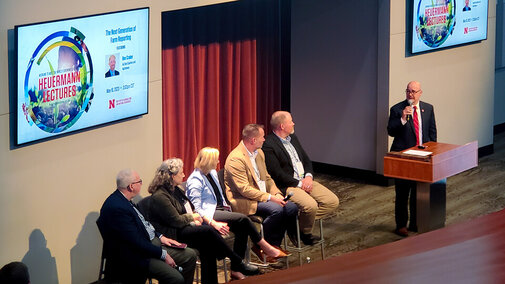How can American ag producers be helped to meet ever-more-detailed reporting obligations for field data? What can be done to give farmers confidence that data-sharing processes will treat them fairly? Are there entrepreneurial opportunities to make data handling more efficient for producers and provide them with financial incentives for data sharing?
A May 10 Heuermann Lecture and an accompanying panel of experts recently addressed those questions at the start of a three-day national conference at Nebraska Innovation Campus.
Producers are already familiar with reporting their ag data for crop insurance or farm payment purposes. But the future is likely to bring reporting obligations requiring far greater detail and complexity, said Heuermann lecturer Ben Craker, portfolio manager at the global nonprofit AgGateway and president of the Ag Data Coalition.
Barcode advancements and associated reporting requirements will enable traceability down to the field level. A growing number of producers are looking at possible eligibility for carbon credits. In both cases, Craker said, farmers will need to meet data-reporting requirements well beyond the current norm.
Craker’s nonprofit, AgGateway, works to help ag producers navigate the complex data-reporting environment. So does Alabama-based GreenPoint Ag Holdings, whose vice president of business innovation and agronomy, Amy Winstead, spoke on the conference’s ag-data panel.
Given the outreach capabilities of organizations like Nebraska Extension, program specialists could consider ways they might contribute as “concierge to all this new technology,” said Cynthia Parr, assistant chief data officer for the U.S. Department of Agriculture’s Research, Education and Economics Mission Area.
The speakers offered their analysis on the opening day of the inaugural conference of the National Agricultural Producers Data Cooperative. That initiative, funded by USDA’s National Institute of Food and Agriculture, is working to create a network of national ag data repositories, ending the disconnect that currently separates multiple, incompatible platforms.

